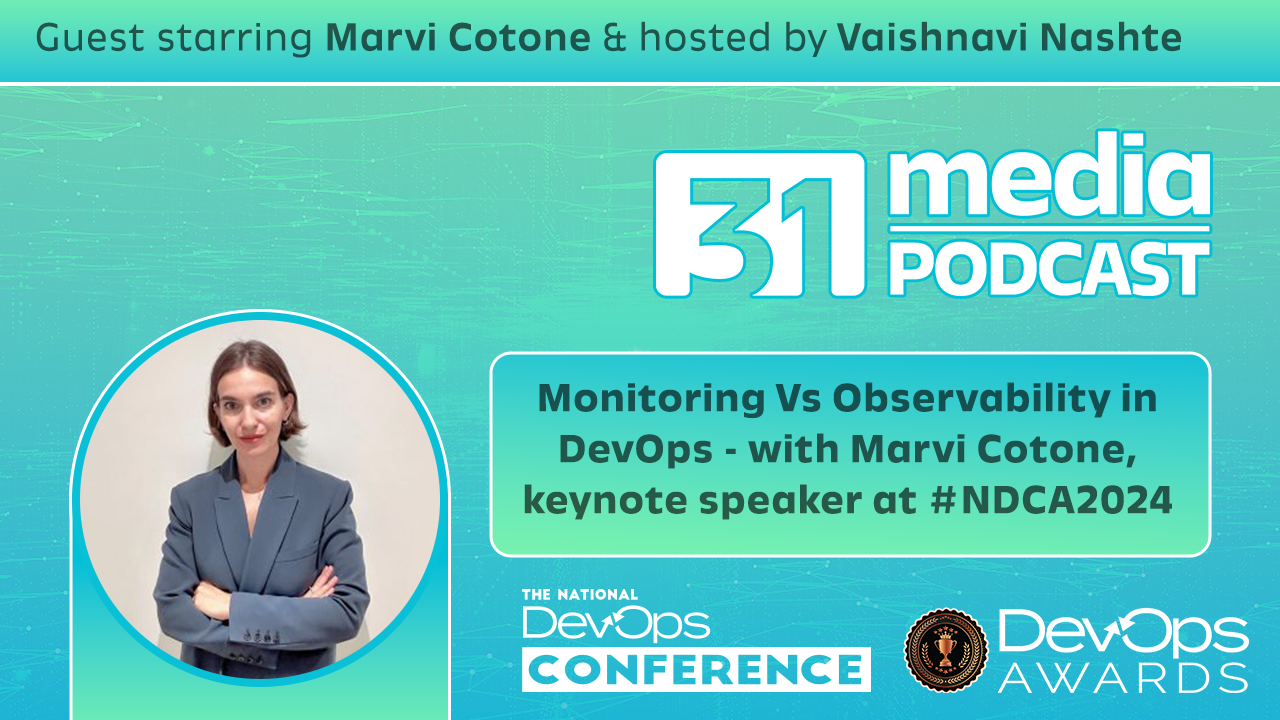#NDCA2024 Speaker Edition
In collaboration with The National DevOps Conference and Awards, we interviewed #NDCA speaker, Marvi Cotone. The conference & Awards takes place in London on the 22nd and 23rd of October 2024. To exhibit your products at the event, please get in touch here.
Author: Marvi Cotone, Deputy Director of Digital Delivery & Architecture at Homes England. She is also a keynote speaker at the National DevOps Conference and Awards
Monitoring vs. observability and their strategic importance
In the world of DevOps, monitoring and observability are often mentioned together, and sometimes even used interchangeably. However, while both aim to help organisations understand and manage complex IT systems, they take different approaches and provide unique insights.
At its core, monitoring is about collecting data. According to Google’s DevOps Research and Assessment (DORA), monitoring involves using tools to track predefined metrics and logs to understand a system’s state. It’s a long-established practice, dating back to the early days of computing (Remember the old friend Norton Disk Doctor?). However, monitoring is catching known issues but often lacking the depth needed to uncover new problems or provide actionable insights.
This is where observability comes into play. Observability goes beyond monitoring by allowing teams to diagnose and debug systems through the analysis of data. It offers a proactive approach, helping teams identify new issues and their root causes more quickly. In essence, monitoring tells you when something is wrong, while observability helps you understand why it’s happening.
As mentioned previously, for organisations aiming to deliver high-quality software at speed, monitoring and observability are not just technical practices—they are strategic tools. Together, they enable teams to continuously deliver value to users by maintaining a balance between speed and quality.
Monitoring provides a real-time view of system performance and alerts teams when predefined thresholds are breached. However, simply collecting metrics isn’t enough; these metrics must be effectively analysed and interpreted to provide meaningful insights.
Observability complements monitoring by offering deeper insights into system behaviour. It helps teams understand not just what went wrong, but why it went wrong, enabling faster resolution of issues and better system transparency.
When integrated into the development process, monitoring and observability streamline operations, enhance system performance, and improve the efficiency of software delivery cycles.

Implementing effective monitoring and observability frameworks
The key factor when implementing effective monitoring and observability frameworks is adopting a mindset that promotes flexibility. It’s essential to adopt tools that support the team’s goals without imposing unnecessary burdens or forcing the adoption of new technologies that don’t align with existing processes.
Here are some key considerations for successful implementation:
- Follow best practices but stay flexible: While it’s important to adhere to industry best practices, teams should also be open to experimenting with different approaches. This flexibility allows them to continuously improve their processes and find the tools that work best for their specific needs.
- Focus on people, not just technology: The success of any monitoring and observability framework extends beyond tools and processes. It requires a focus on the people who manage and use these systems. Teams should approach implementation iteratively, focusing on the vision they want to achieve rather than getting bogged down in the technical details.
- Incorporate user experience data: To truly succeed, observability frameworks should also incorporate user experience data—both synthetic and real-user monitoring. This allows teams to identify issues before users do, leading to better-designed user experiences and continuous improvement of digital offerings.
Enhancing visibility and communication
One of the most significant benefits of monitoring and observability is the increased visibility they provide into systems. This visibility is crucial for making informed decisions that align software development with business goals. By understanding the impact that digital systems have on the business, organisations can make better decisions about where to focus their efforts and continuously improve their digital offerings.
Moreover, monitoring and observability foster better communication within teams. They provide a shared view of system performance, making it easier for teams to collaborate and resolve issues quickly.
In conclusion, implementing monitoring and observability is not just about ensuring stability—it’s about empowering teams to deliver better software, faster, and with greater confidence. When implemented thoughtfully, they become key enablers of long-term success.
Hear Marvi Cotone speak at the National DevOps Conference 2024
Join us for an in-depth presentation on monitoring Vs observability at The National DevOps Conference and Awards, happening in London on October 22nd and 23rd, 2024. This premier event will feature expert insights into how AI is transforming DevOps practices and the broader tech industry.
View the Full Agenda: The National DevOps Conference and Awards Agenda
Exclusive Offer: Gain free entry to the conference by submitting your project to the DevOps Awards before the September 16th deadline. Don’t miss this opportunity to showcase your innovation and network with industry leaders.
For exhibit at the conference, please contact calum.budge@31media.co.uk
Foe media enquiries, please contact vaishnavi.nashte@31media.co.uk


